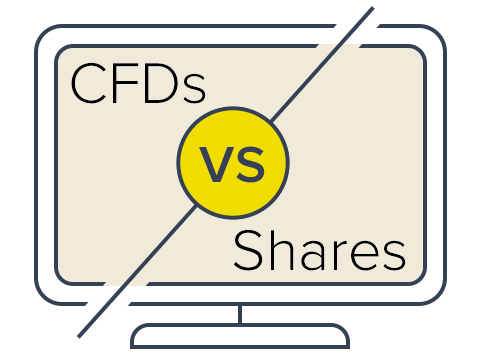
Award-winning
platform
Risk management
tools
2 way trading
Go Long. Go Short
Trade
anywhere
Trade over 10,000
instruments
100% automated
execution
What is a CFD?
A Contracts for Difference (CFD) is a popular form of derivative trading. CFD trading enables you to trade on the rising or falling prices of fast-moving global financial markets (or instruments) such as shares, indices, commodities, currencies and treasuries.
CFD trading explained
Some of the benefits of CFD trading are that you can trade on margin, and you can go short (sell) if you think prices will go down or go long (buy) if you think prices will rise. CFDs are tax efficient, meaning there is no stamp duty to pay. You can also use CFD trades to hedge an existing physical portfolio.
Learn MoreHow to trade CFDs
  |
Choose the instrument you wish to tradeYou can trade CFDs on thousands of instruments, including currencies, indices, commodities, shares and treasuries. |
  |
Decide whether you want to buy or sellGo long (place a buy trade) or short (place a sell trade) based on whether you expect prices to rise or fall. |
  |
Choose your trade sizeYour profit or loss depends on the number of points the market moves in your favour or against you, multiplied by the number of CFD units you have chosen to trade. |
  |
Place your tradeManage your risk by adding any stop-loss or guaranteed stop-loss orders and then confirm your trade |
  |
Monitor your positionFollow your CFD trade from the position screen. If you wish, you can close out or partially close a position at any time. |
What’s the difference between CFDs and share trading?

The main difference between CFD trading and share trading is that you don't own the underlying share when you trade on a share CFD.
With CFDs, you never actually buy or sell the underlying asset that you’ve chosen to trade, but you can still benefit if the market moves in your favour, or make a loss if it moves against you. However, with traditional share trading you enter a contract to exchange the legal ownership of the shares for money, and you own this equity.
CFDs are a leveraged product, which means that you only need to deposit a percentage of the full value of the share CFD trade in order to open a position. But with traditional share trading, you buy the shares for the full amount.
CFD trading |
Traditional share trading |
|
Product Features |
||
|---|---|---|
| Do I own the physical shares? | No | Yes |
| Trade on leverage? | Yes | No |
| Is stamp duty payable? | No | Yes |
| Short-term trading opportunities | Yes | Better for longer-term investments |
Account features |
||
| Demo account available? | Yes | Uncommon |
| Mobile trading available? | Yes | Usually |
Frequently Asked Questions (FAQs)
What is CFD Trading?
Contracts for difference (CFDs) are a derivative product. Trading CFDs helps traders to speculate on financial market instruments be it shares, forex, indices, or commodities, without taking ownership of the underlying assets.
Are CFDs traded using leverage?
CFDs are leveraged products, implying that only a certain percentage of total trading capital is required to open a position and obtain exposure to a much larger sum of money while placing the trade.
Which assets can I trade as CFDs?
CFDs enable traders to trade the price movement across various asset classes, including shares of companies, ETFs, stock indices, commodities, treasury bonds, among others.
Can I receive dividends with CFDs?
Dividends are referred as price adjustments in CFD trading. When a company announces dividends and if a client is holding the long position, s/he is paid dividends. Meanwhile, the equivalent amount is charged if the client is holding the short position.
How can I trade CFDs with Century Financial?
With Century Financial you can trade over 10,000 instruments. Decide whether you want to go long (place a buy trade) or short (place a sell trade) based on whether you expect prices to rise or fall; choose your trade size; place your trade; and monitor your position.
Ready to Invest?
Explore a new trading experience with
Century Trader App
Losses can exceed your deposits
Ready to Invest?
Explore a new trading experience with
Century Trader App
Losses can exceed your deposits













